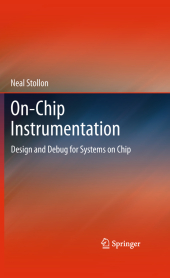 Neuerscheinungen 2014Stand: 2020-02-01 |
Schnellsuche
ISBN/Stichwort/Autor
|
Herderstraße 10
10625 Berlin
Tel.: 030 315 714 16
Fax 030 315 714 14
info@buchspektrum.de |

Neal Stollon
On-Chip Instrumentation
Design and Debug for Systems on Chip
2011. 2014. x, 244 S. 235 mm
Verlag/Jahr: SPRINGER, BERLIN; SPRINGER US; SPRINGER 2014
ISBN: 1-489-99230-8 (1489992308)
Neue ISBN: 978-1-489-99230-7 (9781489992307)
Preis und Lieferzeit: Bitte klicken
This book provides an in-depth overview of on-chip instrumentation technologies and ways of adding ´design for debug´ (DfD) instrumentation to system-on-chip design. As well as focusing on hardware implementations, software and tools are discussed in detail.
This book provides an in-depth overview of on chip instrumentation technologies and various approaches taken in adding instrumentation to System on Chip (ASIC, ASSP, FPGA, etc.) design that are collectively becoming known as Design for Debug (DfD). On chip instruments are hardware based blocks that are added to a design for the specific purpose and improving the visibility of internal or embedded portions of the design (specific instruction flow in a processor, bus transaction in an on chip bus as examples) to improve the analysis or optimization capabilities for a SoC. DfD is the methodology and infrastructure that surrounds the instrumentation. Coverage includes specific design examples and discussion of implementations and DfD tradeoffs in a decision to design or select instrumentation or SoC that include instrumentation. Although the focus will be on hardware implementations, software and tools will be discussed in some detail.
Introduction to On Chip Debug.- On Chip Debug as part of the verification flow.- Types of On Chip Debug Systems.- In Systems Instruments.- Classes of On Chip Instruments.- Introduction to standard Instrumentation Interfaces.- Tools and analysis issues.- Comparison of widely used instrumentation systems.- SoC and IP Debug; Instrumentation in ASSPs.- FPGA debug; System integration issues.- ESL and RTL tool integration.- Future Directions.


